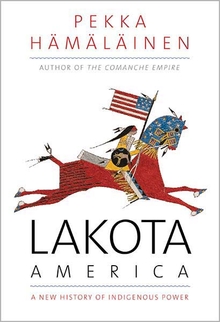It feels like forever since I've traveled--overseas flights and walking holidays seem like a distant memory. I'm used to thinking of travel as a luxury which requires a certain minimum of money and leisure; but a privilege which can also scale according to circumstances to be basic or luxurious. In other words, in the modern perspective, travel is something that people of a certain basic level of social and financial capital actively seek out. Unconsciously, I've been applying this standard to my thinking about late antique letter carriers--I'm currently in the process of writing an article about their journeys across borders in late antiquity. While the bearer of a letter or gift usually traveled at the behest of someone else, my study of their journeys has hitherto rested on my unexamined assumptions about the nature of travel, namely that it is (and was) something people enjoy and seek out where they can.

Lately I've been reading Pekka Hämäläinen's Lakota America: A New History of Indigenous Power--which I enthusiastically recommend even though I'm currently two chapters from finishing it--and rethinking my assumptions about travel, thanks to the following comments on late seventeenth century diplomacy:
Sioux did not want to go east, neither as diplomats nor as traders. They wanted people to come to them. They wanted the French to bring iron to their villages and they wanted their allies to live with them. To be powerful in late seventeenth century North American meant having allies and kin. Distances were enormous and people lived far apart, which meant that access to resources--goods, humans, markets--was critical. So was a capacity not to move. Travel was dangerous and arduous--it took French traders three to four weeks to paddle downriver from western Lake Superior to Montreal and twice the time to paddle back--which meant that immobility connoted power: the weaker traveled to the more powerful, and markets were not so much opened up as brought in. (Hämäläinen, 38)
The conditions of seventeenth century North America also apply to the late Roman Mediterranean. Late antique correspondents might be separated by significant distances; access to human, economic, and material resources was essential but travel was potentially difficult, time-consuming, and dangerous. The letter carrier, therefore, was the less powerful link between two individuals who were powerful enough to choose immobility. If travel was a burden, not a privilege, then I need to reconsider what letter carriers' mobility really says about their status.
(As a postscript to my recommendation: Lakota America has been reviewed glowingly by Parul Sehgal in the New York Times; I want to acknowledge and highlight Lakota responses to the book, such as the review by Dakota Winds on his blog The First Scout and the review by Delphine Red Shirt in the Lakota Times.)
No comments:
Post a Comment